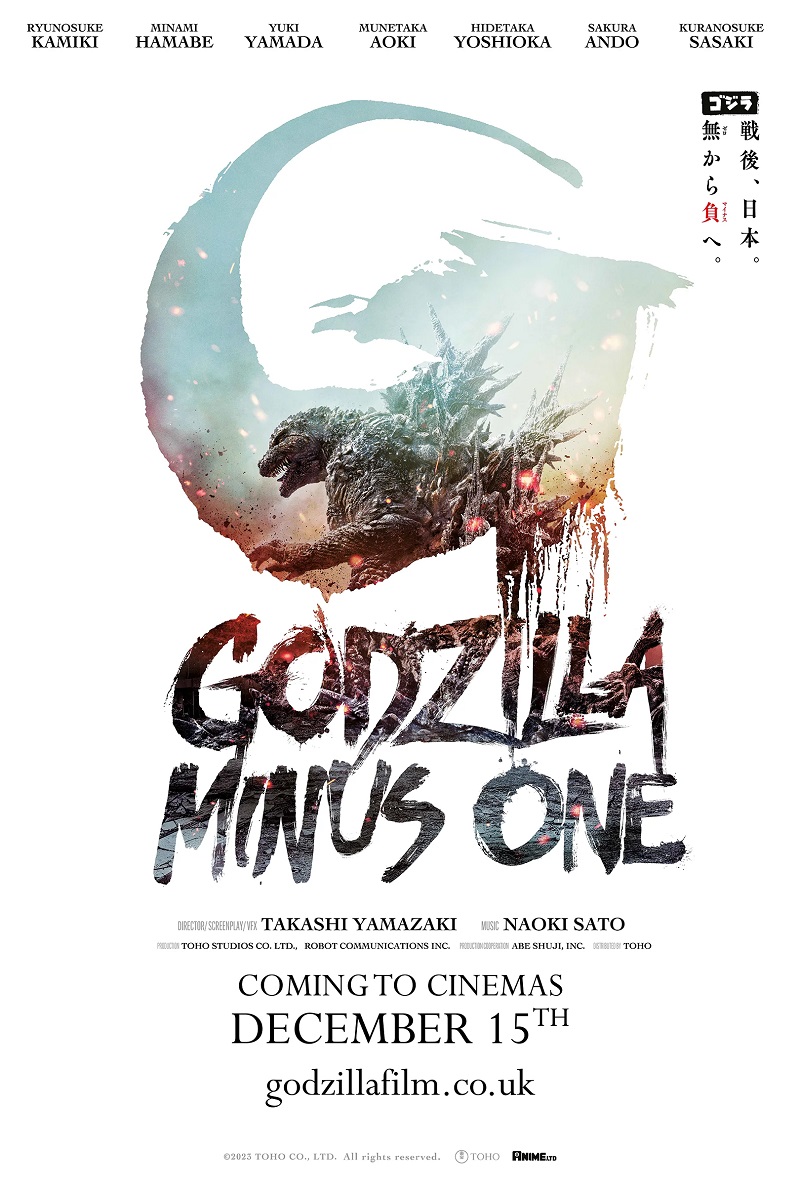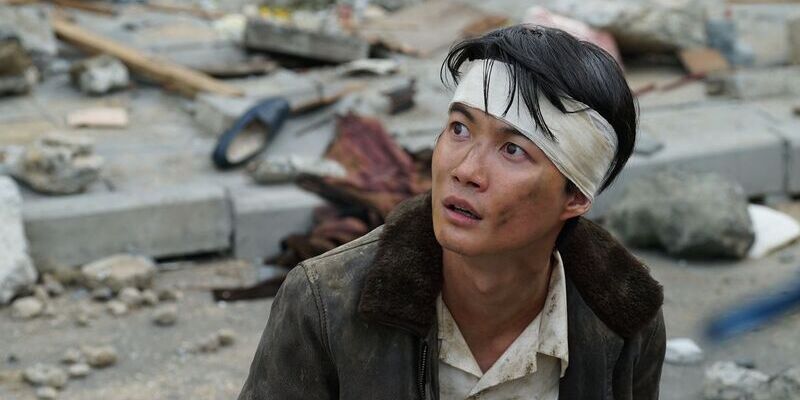
Review by
Eric Hillis
Directed by: Takashi Yamazaki
Starring: Ryunosuke Kamiki, Minami Hamabe, Yuki Yamada, Munetaka Aoki, Hidetaka
Yoshioka, Sakura Ando, Kuranosuke Sasaki

Godzilla, or Gojira if you're Japanese, first appeared in 1954 as a giant
destructive metaphor for Japan's collective apprehension over nuclear
annihilation, the memory of Hiroshima and Nagasaki still fresh in the
nation's conscience. That first film was a relatively gritty take on the
giant monster genre but as Japan recovered and became one of the world's
leading economic powerhouses, the sequels would become increasingly goofy as
men in rubber suits stomped on train sets and a series of whacky rival
monsters were introduced. In 2016 Toho Studios revitalised their most famous
creation with
Shin Godzilla, a reboot which successfully took the series back to its more grounded
roots. Rather than the expected sequel to Shin Godzilla, we have another reboot in Godzilla Minus One, which ups the ante and is no doubt the best movie to ever bear the
Godzilla name.
Writer/director Takashi Yamazaki does for the monster movie here
what Christopher Nolan did for superhero movies with
The Dark Knight, proving that a genre known largely for its sillier aspects can be taken
seriously while still delivering audience-pleasing thrills. Indeed, Nolan
appears to be a key influence on Yamazaki, whose film often resembles
Dunkirk
both in its theme of how there's no shame in survival and in its decidedly
Nolan-esque ticking clock narrative.

That first idea is represented by the film's protagonist, Koichi (Ryunosuke Kamiki), a kamikaze pilot who aborts his mission in the dying days of WWII and
lands on a small Pacific island used as a Japanese refuelling base. It's
there that he first encounters Godzilla, who emerges from the sea and kills
everyone in sight barring Koichi and an engineer, Tachibana (Munetaka Aoki), who blames Koichi for freezing when he had the beast in the sights of
his plane's gun. Riddled with guilt, Koichi returns to a Tokyo left in
rubble by American bombing. A neighbour blames his "cowardice" for the
deaths of her family, but Koichi is befriended by Noriko (Minami Hamabe), a young woman who turns up with an infant girl she rescued from the
rubble. Sharing a home, Koichi, Noriko and the child become a surrogate
family. Noriko doesn't care if Koichi failed in his duties during the war,
she's simply appreciative that he's around now. Koichi takes a job on a
minesweeping vessel and begins to rebuild his life just as his country is
putting itself back together. He clearly has feelings for Noriko, but his
guilt won't allow him to act on them.
Godzilla Minus One's title is a reference to the Japanese idea of "Year Zero," when the
nation decided it needed to reset itself following World War II. When the
giant lizard shows up in Tokyo in 1947, there's the fear that its presence
will ruin all the progress the nation has made over the previous two years
and that Japan will sink back into the militaristic mindset of its imperial
era. It always irks me in monster movies when the military shows up like the
cavalry in the final act and resolves things through brute strength. I much
prefer those monster movies where the heroes are scientists and everymen who
find an answer through a combination of brainpower and pooled resources.
That's what we get here. Godzilla Minus One is decidedly
anti-military and explicitly denounces Japan's more toxic traditions
regarding honour through sacrifice (I imagine Japan's far right elements are
incensed by its existence). Mistrusting the government, a group of boffins
and former sailors, including Koichi, come together to find a way of taking
down Godzilla. It's no easy task, as due to American nuclear testing in the
Pacific, the monster has ingested radiation which gives it not only the
power to regenerate its wounds but to fire atomic blasts from its
throat.

The western influence on Yamazaki's film extends to taking the premise of
Jaws, a ragtag group heading out into the ocean to take on a formidable
creature, and amping it up with destroyers and bombs rather than trawlers
and harpoons. Like Gareth Edwards did with his
Godzilla
in 2014, Yamazaki homages the famous shot of the shark swimming beneath the
boat, this time with Godzilla's massive form making its way under a
battleship. Like Jaws, the action works not only because it's very well choreographed and
coherently assembled, but because we actually care about the people
involved. There's a commendable focus on character here, with some scenes
that wouldn't be out of place in a Hirokazu Kore-eda or Naomi Kawase film.
The movie occasionally leans into clichés but it earns the right to do so,
and there's something intensely satisfying about its more predictable
elements, like the familiar taste of your favourite burger.
The titular beast has never looked better. The CG creation is a huge step
up from the dodgy FX of Shin Godzilla and is more convincing
than the version seen in recent Hollywood offerings. More than any previous
version, this Godzilla behaves like an animal. Its trail of destruction is
merely instinctive rather than a product of human-like sentience. When it
pulls a train carriage off an overhead track it might just as well be a dog
swiping a pair of knickers from a washing line. Of course, nature can be
terrifying too, and when this Godzilla's scales turn a neon blue as it
charges up its radioactive blast you can feel the apprehension rumbling
through the audience. The resulting explosions make the centrepiece of
Oppenheimer
look like a fizzling firecracker in comparison. Unlike recent Hollywood
monster movies, all the action here takes place in daylight, allowing us to
bask in the awesomeness of its titular terror.

Godzilla Minus One is a proper spectacle, the sort of movie
that makes you feel like an ant as you stare up at the screen. It's
remarkable that it was made for less than $15 million (Hollywood really
needs to take a long hard look at itself). Spectacle is nothing without
heart though, and Godzilla Minus One throbs with humanity. But
what's most notable about Yamazaki's film is how revolutionary it feels in
proffering the anti-nationalistic idea that no country is worth martyring
yourself for, but those you love are worth staying alive for.

